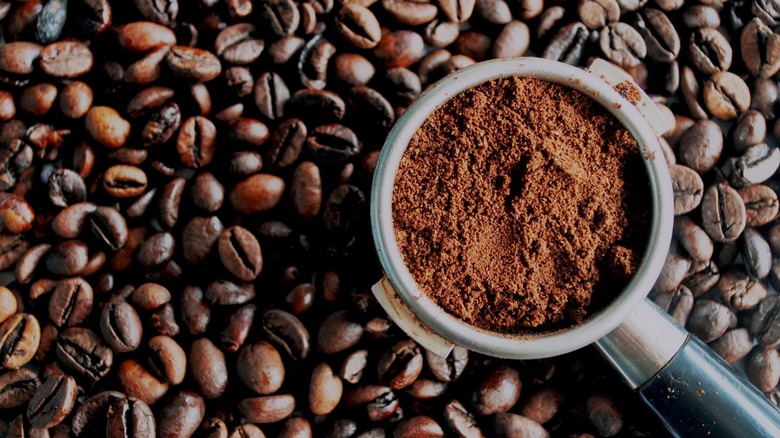Why You Should Avoid Oily Coffee Beans When Making Espresso
From using the proper water temperature to employing a good tamping technique, pulling a good shot of espresso is no trivial task. But here's the thing: No matter what fancy technique or expensive equipment is used, your brew can only be as good as your beans. Beyond origin and roast level, one thing that's often overlooked when people talk about coffee beans is the oiliness. Ever open a package of freshly roasted coffee beans and found the beans to have a noticeable shine or a slick feel when you touch them? That's natural oil coming out of the beans as a result of roasting.
Darker roasts usually have more of this oil and shine, which gives them that deep, smoky flavor you might love. It's actually normal for dark roasts to be a bit oily, but if your lighter or medium roasts are sporting that same oily sheen? That's a red flag. Those beans should be dry, and oiliness probably means that they weren't stored properly before they landed in your kitchen. But a flavorless cuppa would be the least of your problems if you do decide to brew those oily beans.
Run oily beans through your grinder, and gunk would build up within it. Suddenly, your later batches of grounds are all over the place in terms of consistency. When the oily grounds hit your espresso machine, the oil can clog up its components, leading to uneven extractions. To top it all off, coffee oils go rancid pretty quickly, so if you don't clean your espresso machine often, they'd contaminate later cups with a bitter and burnt taste. That's why, if you're serious about your espresso game, think twice about using those glossy-looking coffee beans!
De-oiling your coffee beans
No worries if you've accidentally bought a batch of oily beans; they're still perfectly usable with a few adjustments. But heads-up, you'll need to become friends with your cleaning supplies for a while. For as long as those beans last, you'll need to give your equipment extra love. Wiping down the coffee grinder and cleaning your espresso machine more often will prevent things from getting gunky. If you have one of those expensive machines with fancy automated cleaning functions, you'll want to hit that button or schedule those cycles more often than usual.
As for the beans themselves, you can mix them with some drier beans to balance things out. Throw the oily dark roasts together with a drier medium roast, and you'll cut down the oil while still getting those deep, chocolatey notes you're after. Or, if you're not in a rush, spread your beans out on a tray somewhere breezy for a couple of days to air-dry them out before storing them. You can also dry them out in a food dehydrator set on low.
Once you've used up that batch, the next time you're bean shopping, pick dark roasts with a more matte look rather than that super shiny finish. In case you like to shop online and can't see what you're getting, maybe give lighter types of coffee roasts a try instead if you'd prefer to avoid oily beans completely. They'll still give you most of the rich flavors you love, but with none of the troublesome oils!

